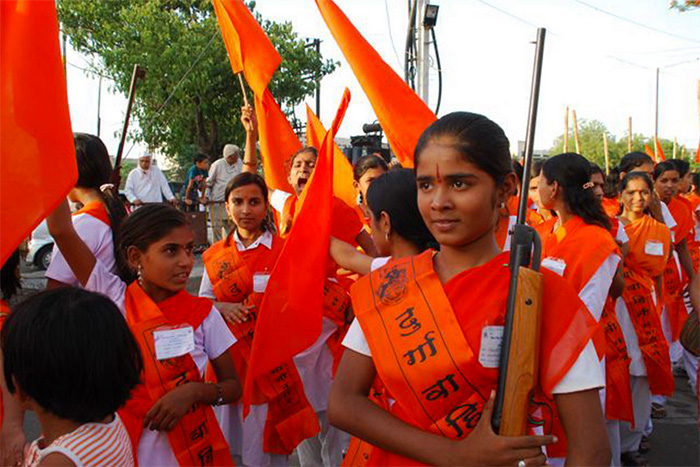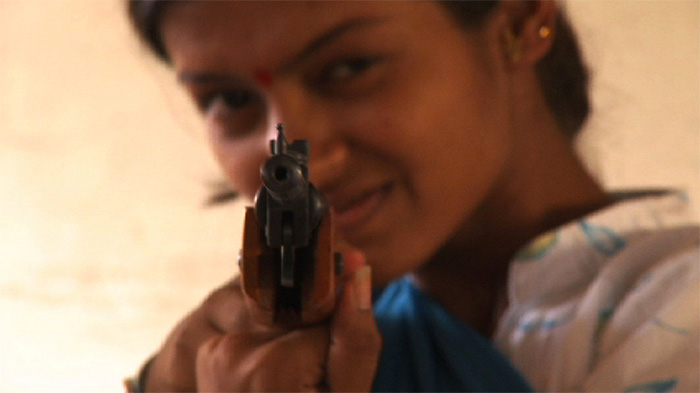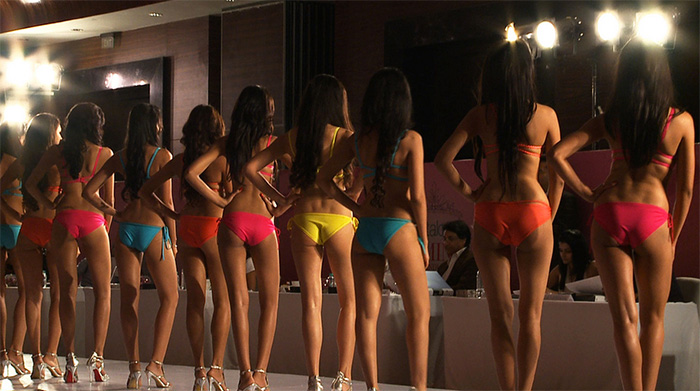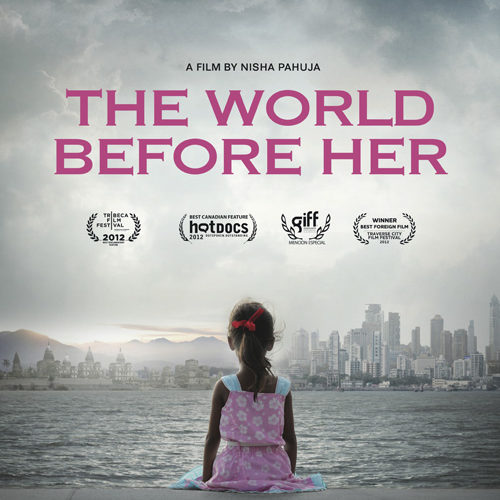If Nisha Pahuja‘s documentary The World Before Her is correct, India is at a very important crossroads in its history. Half the country is steeped in orthodox Hinduism with a conservative viewpoint on gender roles and life under God while the rest looks towards a future of modernization and equality with the Western world. Two spheres in direct opposition with no middle ground in sight, a war has begun raging between religion and freedom with young women caught on the frontlines. They’re growing up in a society without easy answers or consistency in public reaction where half a billion people are in staunch defiance to their beliefs no matter which faction they’re aligned. But while the nation is fractured on ideology, both sides are utilizing early enlistment tactics to win over their newest generation.

Honing in on two of the more prevalent avenues for girls to gravitate towards, Pahuja shows what a twenty-first century “factory” looks like. For nineteen-year old Ruhi Singh, aspirations to be a success with the type of financial security usual reserved for her nation’s men means working towards a Miss India crown. One of the final, handpicked twenty to vie for the title in Bombay, she must partake in a thirty-day grooming/training regime as those in charge of making her presentable admit the whole process is truly the manufacturing of a modern Indian woman. Ruhi comes from a middle class liberal family, though, and is therefore provided with more “radical” ideas of equality than girls in rural areas without such luxuries of forward thinking. This is where the Hindu Nationalists come in.
Camps run by the women’s wing—Durga Vahini—step in to teach the sanctity of Hindu culture and the importance of defending it by all means necessary. To them a woman’s role is to be married by the age of eighteen so that her true purpose of becoming a mother can be met. But while such subservience is taught in the house, these nationalists are ultimately extremists waging blood feuds with their Muslim and Christian counterparts. Pahuja plays footage of the retribution wrought against non-Hindus as well as the violent abuse of women in the streets for nothing more than going out in public at the same time as religious zealots. Nonviolence is a joke and Gandhi a man to revile—if someone harms them, they’ll respond in full until the lesson is learned.

The World Before Her‘s stark juxtaposition may surprise in its intricacies, though, after delving into the psyches of the four girls followed. While the aforementioned Ruhi dives head first into the pageantry, not all beauty contestants are as naïve. Ankita Shorey, for instance, knows exactly what’s happening as well as the game she must play despite reservations for the rules. The crown is a victory at the cost of dignity and morality, but it’s not so easy within a third world nation possessed by the type of volatility shown here via massive protests of the very idea an Indian contest can be won on looks. On the flipside, while grade schooler Chinmayee asked her parents for admittance to the Durga Vahini camp, one of its most decorated members willfully attempts to carve her own path.
Prachi Trivedi proves the most intriguing character of the bunch as a result. Raised as the only child of a father who wished for a boy, she praises everyday she’s alive as a miracle due to India’s penchant for expunging the feminine in hopes a male will follow. Her father has the right to abuse her because he gave her that gift of not becoming one of the 750,000 abortions each year due to sexual inferiority. But while she loves using her twenty-one years of experience at the camp to command new members and make them fear her, she has no interest in practicing what she preaches. At twenty-four she should already be married and despite her father saying she still will, working full-time for the movement is the only partnership she hopes to form.

This is the first time the Durga Vahini has let cameras inside to see the rhetoric of leaders like national President Malaben Rawal firsthand alongside the brainwashed reasoning of Prachi on why they aren’t a terrorist camp and Chinmayee’s pride in admitting she has no Muslim friends. While these girls go through weapons training, those preparing for Miss India learn how to walk with chests out to gain an advantage after Botox injections have plumped up their features and whitening sessions lightened their skin. But none of this superficiality makes the contestants less Hindu in their minds because they’ve never seen anything in their practices or readings that dictated appearance. In fact, the Hindu extremists’ immovable position on the subject has most fearing they’re more dangerous to national security than their Muslim counterparts.
Pahuja has found a captivating dynamic in these polar opposites and watching them advance through their lessons is as enlightening as it is horrifying. We hear from the girls themselves, the differing ideologies of parents, and the terrible abuse wrought behind the scenes. Both sides are fighting for a brighter India, but their utopias couldn’t be farther apart. It’s the same story with every religion—moderates breaking free from extremists to form newer variations on an original concept long since forgotten in lieu of selfish desire and personal interpretation. India is arming its women with independence at the same time it takes it away and does so with calculated processes that have been honed for the best results. As humanity is forced into specific roles, however, the rules become warped and peace a distant memory.
The World Before Her hits VOD on Tuesday, August 6th.

